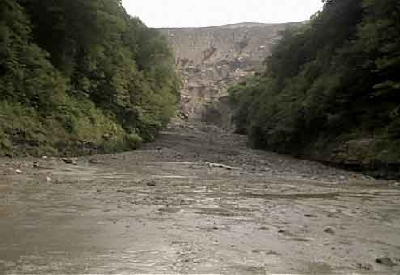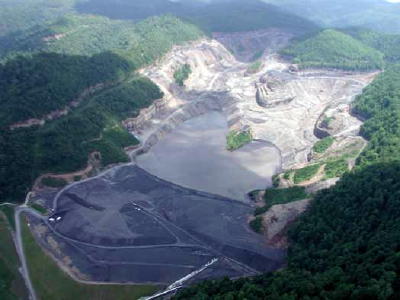
Massey's valley fill (pictured above on July 19,2002), like all MTR
valley fills was created when rubble from former mountaintops--that
were blasted away to mine the underlying coal--was pushed into a nearby valley, burying any streams that were there. Courtesy of www.ohvec.org
Environmental interests had a small victory last week over King Coal, after hundreds of miles of WV streams have been filled or polluted by mining.
District Judge Robert C. Chambers blocked permits for four mountaintop removal mines, in a significant ruling that could force tougher regulation of West Virginia's coal industry.
Chambers, citing an "alarming cumulative stream loss" to valley fills, ruled that more thorough reviews of the mines' potential impact on the Mountain State's streams and ecology must be done before permits can be approved.
Chambers wrote "Coal mining has long been part of the fabric of Appalachian life, providing jobs to support workers and their families and energy to fuel the nation ... Unfortunately, coal mining also exacts a toll on the natural environment ... In particular, the mining technique at issue in these permits potentially results in dramatic environmental consequences."
Chambers revoked four permits issued to subsidiaries of Massey Energy, sending the mine proposals back to the U.S. Army Corps of Engineers.
Chambers found that the Corps' methods for examining permit applications were severely lacking, especially how the corps measures the ecological loss of burying small, headwaters streams.
Some coal operators responded by saying the decision is a major set-back for the industry in West Virginia, indicating more jobs will be lost.
Coal operators have nearly always blamed the loss of thousands of mining jobs on environmentalists, but most of the loss is linked
to mechanization.
It takes a hand-full of workers to operate a mountaintop dragline.
An industry supported bill in the last legislature session would have striped hundreds of streams from lists of protected West Virginia waterways.
A Senate Natural Resources Committee, supporting the coal industry, removed 88 percent of WV streams on the protected list - the number of protected streams being reduced from 309 to 39.
Environmental Protection Secretary Stephanie Timmermeyer said "This is just 4 percent of the state's streams, some are the gems of West Virginia's surface waters."
"There was mis-information out there that farmers could no longer farm and that timbering could not occur and that oil and gas drilling would have to stop," said DEP spokesperson Jessica Greathouse, a mis-representation to get other groups on the bandwagon.
Meanwhile, a second Massey Coal silo within a few feet of Marsh Fork Elementary School has gained momentum and could be constructed.

Marfork Coal's (a Massey Energy subsidiary) Brushy Fork coal slurry impoundment, which, at its final stage, will hold 8 billion gallons of coal waste sludge. The impoundment partially lies over old underground mines and is directly upstream from the town of Whitesville, West Virginia. Photo by Vivian Stockman, May 30, 2003
Courtesy of www.ohvec.org
| 


